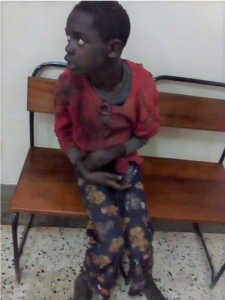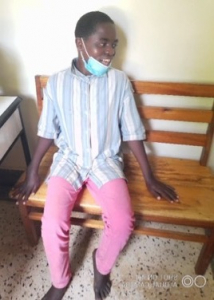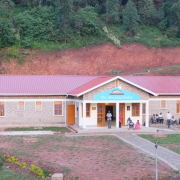The boy in the drain.
For many charities, the pandemic has brought huge challenges. We at Jamie’s Fund are so grateful that the way we work means that training and service development in Uganda continues to make progress even though we have not been able to visit. And happily, we are hearing of wonderful results in some of the church hospitals
One medical director told us that since the training which JF supported, his ward rounds have changed significantly. “Now I hear all about the patient’s mental health as well as their physical symptoms. And so we can treat them properly.”
We are thrilled that the training is really making a difference. Ewan and I were at a recent celebration of World Mental Health Day at one of our Kampala partners, Lubaga Hospital. There were lots of balloons! We were on Zoom, of course. But we were glad to see Joshua, our chief mhGAP trainer for Jamie’s Fund in the church hospitals. He was able to be present in person at the celebration, and we heard his lovely speech praising the team for doing so well with their training, remembering it, and best of all, really putting it into practice and changing patients’ lives for the better.
Kisiizi Hospital, way down in the south west of Uganda, was our first partner when we started JF. We recently received a moving story of how the mental health team there puts the hospital’s witness to “care for the vulnerable” into action. In much of Africa, people with epilepsy are cared for (if at all) by mental health services.
Justus, found in a drain.
It was early December. Fourteen year-old Justus (not his real name) was found by the police in a drainage ditch in the rain. He kept having epileptic fits and no one knew who he was.

The police brought him to Kisiizi Hospital, where the mental health team cared for him in every way possible – he was very weak, unable to sit up or feed himself at first. He needed medication for his seizures. And the team needed to find his family.
Many people with epilepsy throughout Africa don’t get the medical treatment they need. Usually the seizures are believed to be due to evil spirits or witchcraft, so the person is taken to the traditional healer or a religious healer who will try performing exorcism, often for hours at a time. If they do find their way to a modern hospital, supplies of the right medication may not even be available.
Justus was lovingly cared for by Orishaba Georgious, the Psychiatric Clinical Officer, and the team at Kisiizi. He responded well to medication, and began to eat and gain strength.
But how to reunite him with his family? I’ve been surprised and impressed at how this works in rural African communities. If the person themselves has no information or is unable to give any details, you begin by asking in the neighbourhood of where they were found. Then networks of neighbours, local councils, village workers, parish members and council leaders are all brought into action.

Some of the information thus gained may be a bit doubtful – for example that “there used to be a boy with seizures in the village on that hill over there”. But steadily and patiently the team made the connections for Justus. On 25th February, finally, they found his family.
One of the many effects of the pandemic has been transport – not just for patients, but also for the medicines needed to treat them. Getting supplies of medication for patients with epilepsy has been a real challenge for many of the hospitals we support.
Kisiizi’s mission is to ensure that their patients can return to “Life in all its fullness”.
For one vulnerable teenager, now back at home with his family and still under the care of the mental health team, that vision can begin to be fulfilled.
Maureen Wilkinson
with Orishaba Georgious

